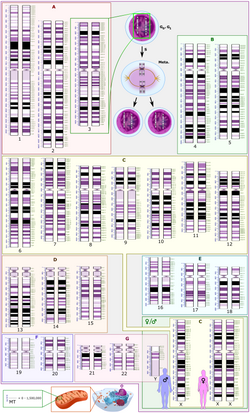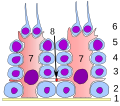Somatic (biology) (section Mutation frequency)
of the body. The frequency of mutations in mouse somatic tissue (brain, liver, Sertoli cells) was compared to the mutation frequency in male germline...
4 KB (461 words) - 11:11, 20 May 2023
Mutation frequency and mutation rates are highly correlated to each other. Mutation frequencies test are cost effective in laboratories however; these...
5 KB (674 words) - 03:29, 29 January 2025
cell populations, cells with mutations will increase or decrease in frequency according to the effects of the mutations on the ability of the cell to...
119 KB (14,264 words) - 07:00, 9 June 2025
In genetics, the mutation rate is the frequency of new mutations in a single gene, nucleotide sequence, or organism over time. Mutation rates are not constant...
28 KB (3,328 words) - 09:52, 8 June 2025
are differences in the types of mutation seen in the germ and in the soma. There is variation in mutation frequency between different somatic tissues...
18 KB (2,174 words) - 23:57, 24 May 2025
Germ cell (section Mutation and DNA repair)
cells, that is 5 to 10-fold lower than the mutation frequency in somatic cells Thus low mutation frequency is a feature of germline cells in both sexes...
31 KB (4,040 words) - 22:46, 3 April 2025
higher exome mutation frequency) the total number of DNA sequence mutations is about 80,000. This compares to the very low mutation frequency of about 70...
51 KB (5,895 words) - 21:44, 29 May 2025
Mutation Frequency Decline (mfd) is the gene which encodes the protein Mfd (also known as Transcription Repair Coupling Factor, TRCF). Mfd functions in...
6 KB (659 words) - 05:02, 31 May 2025
A frameshift mutation (also called a framing error or a reading frame shift) is a genetic mutation caused by indels (insertions or deletions) of a number...
36 KB (4,728 words) - 21:46, 4 October 2024
deleterious (very small s {\displaystyle s} ) and the mutation rate is not very high, the equilibrium frequency of the deleterious allele will be small. In a...
10 KB (1,432 words) - 19:57, 25 May 2025
Whole genome sequencing (section Mutation frequencies)
Furthermore, mutation frequency can vary between cancer types: in germline cells, mutation rates occur at approximately 0.023 mutations per megabase,...
115 KB (9,584 words) - 14:04, 2 June 2025
DNA damage theory of aging (redirect from Genetic mutation theory of aging)
cells, mutant cells will increase or decrease in frequency according to the effects of the mutation on the ability of the cell to survive and reproduce...
97 KB (11,166 words) - 18:24, 9 June 2025
cell types from the same individual. Female germ cells also show a mutation frequency that is lower than that in corresponding somatic cells and similar...
15 KB (1,793 words) - 12:56, 25 May 2025
Sertoli cells have a higher mutation frequency than spermatogenic cells. Compared to spermatocytes, the mutation frequency is about 5 to 10-fold higher...
26 KB (3,059 words) - 14:02, 25 September 2024
in 1946, asserted in his Nobel lecture, The Production of Mutation, that mutation frequency is "directly and simply proportional to the dose of irradiation...
39 KB (4,633 words) - 00:52, 25 May 2025
Germline (section DNA damage, mutation and repair)
transversion mutations. Such mutations occur throughout the mouse chromosomes as well as during different stages of gametogenesis. The mutation frequencies for...
17 KB (2,066 words) - 18:44, 24 May 2025
Genetic load (redirect from Mutation load)
the accumulation of mutation load, culminating in extinction via mutational meltdown. The accumulation of deleterious mutations in humans has been of...
20 KB (2,477 words) - 14:52, 21 May 2025
chromosome and causing mutation. Transposon mutagenesis is much more effective than chemical mutagenesis, with a higher mutation frequency and a lower chance...
18 KB (2,213 words) - 01:59, 1 December 2023
Spermatocyte (section Specific mutations)
the mutation frequencies of cells at the different stages, including pachytene spermatocytes, are 5 to 10-fold lower than the mutation frequencies in somatic...
19 KB (2,049 words) - 00:37, 14 April 2025
DNA mismatch repair (category Mutation)
spontaneous mutation rate (mutator phenotype). In comparison to other cancer types, MMR-deficient (MSI) cancer has a very high frequency of mutations, close...
37 KB (4,466 words) - 20:37, 29 May 2025
In genetics, a nonsense mutation is a point mutation in a sequence of DNA that results in a nonsense codon, or a premature stop codon in the transcribed...
31 KB (2,878 words) - 14:01, 23 May 2025
the ebony mutation to a wild-type population. The ebony allele persisted through many generations of flies in the study, at genotype frequencies that varied...
24 KB (3,022 words) - 19:50, 25 May 2025
Oum, Muna; Del Longo, Alessandra; et al. (January 2014). "SLC45A2 mutation frequency in Oculocutaneous Albinism Italian patients doesn't differ from other...
29 KB (3,589 words) - 13:17, 23 May 2025
Stop codon (redirect from Amber mutation)
colors. Nonsense mutations that created this premature stop codon were later called opal mutations or umber mutations. Nonsense mutations are changes in...
30 KB (2,823 words) - 18:36, 24 May 2025
stages of development in the mouse have a frequency of mutation that is 5 to 10-fold lower than the mutation frequency in somatic cells. In Drosophila, the...
33 KB (3,984 words) - 19:02, 25 May 2025
mechanism), gene flow, and mutation combine to change allele frequencies across generations. Genetic drift causes changes in allele frequency from random sampling...
8 KB (1,093 words) - 20:35, 18 December 2024
Genetic hitchhiking (redirect from Hitchiker mutation)
allele frequencies too. Selective sweeps happen when newly appeared (and hence still rare) mutations are advantageous and increase in frequency. Neutral...
10 KB (1,280 words) - 07:08, 10 February 2025
Somatic evolution in cancer (redirect from Driver mutation)
Somatic evolution is the accumulation of mutations and epimutations in somatic cells (the cells of a body, as opposed to germ plasm and stem cells) during...
87 KB (9,928 words) - 18:56, 22 May 2025
Endometrioid tumor (section CTNNB1 and PTEN mutations)
endometrial endometrioid carcinomas (28%). This difference in CTNNB1 mutation frequency may be reflective of the distinct tumoral microenvironments; the epithelial...
7 KB (546 words) - 22:00, 3 January 2025















